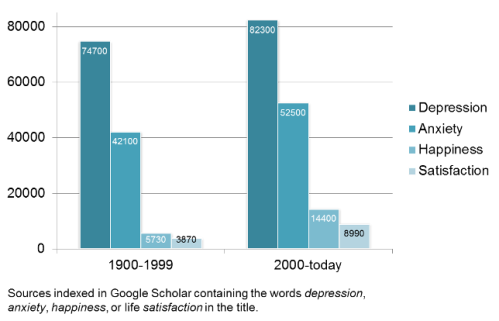When I talk about Positive Psychology in Germany, I also talk about the necessity for this rather recent branch of research and practice (see the slides below), referring to the fact that most psychological research is centered around a disease model, thereby concentrating on mental illness, its antecedents, and cures – just as Martin Seligman and Mihály Csíkszentmihályi propose in their seminal article Positive Psychology: an Introduction.
Today, I wanted to check if this is really true – and if the onset of Positive Psychology at this millennium has does anything to change that conjectured imbalance. Therefore, I went to Google Scholar and searched for articles which titles` contain either the words depression, anxiety, happiness, or life satisfaction. For a first round, I limited the search to articles that were published between 1900 and 1999. For a second round, I counted all the articles that have been published afterwards. Here´s what I´ve found:
A first stunning finding* is the fact that, in the last 15 years, more papers were published than in the previous 100, no matter on what subject. Whether that is a desirable development with regard to quality and impact remains to be seen.
But more importantly, the imbalance between research focusing on desirable vs. undesirable states is clearly visible in the chart. In the 20th century, papers focusing on depression outnumber those focusing on happiness by a factor of 13. For anxiety and life satisfaction, it´s factor 10.9.
Now what has changed over the last 15 years? The answer is: Positive Psychology has made quite an impact: an increasing publication rate in this branch of psychology results in a (at least slightly) more balanced ratio. Depression outnumbers happiness by “only” 5.7, anxiety outnumbers life satisfaction by “only” 5.8.
I´ve put the world “only” in parentheses since that still is very far away from a sort of equilibrium. But progress has been achieved. And there will be more…
* Of course, the overall number of publications is much higher. But I suppose that counting papers containing a specific word in the title is a pretty decent proxy for the general writing activity in a sub-branch of research.






 For all of you that just cannot get enough of first-class Positive Psychology content – here’s something brand new for you:
For all of you that just cannot get enough of first-class Positive Psychology content – here’s something brand new for you:
 Ever since 2012, March 20 is
Ever since 2012, March 20 is 


